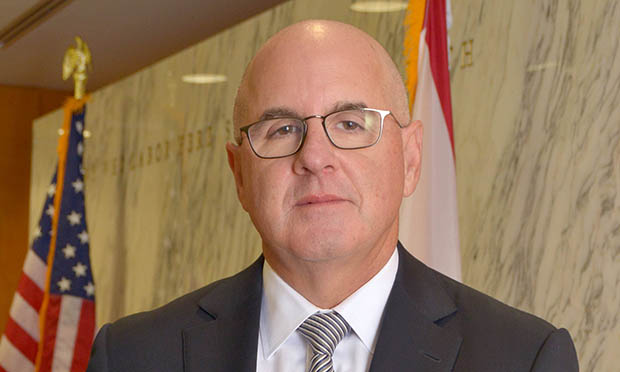Miami Judge Survives Call for Recusal in Foreclosure Suit Marred by Forgery Claims
Judges are bound by a strict code of ethics that says even the appearance of impropriety warrants removal, but allegations in this case didn't pass the appellate panel's scrutiny.
January 30, 2020 at 10:58 AM
3 minute read
 Miami-Dade Circuit Judge Michael Hanzman. Photo: AM Holt/ALM.
Miami-Dade Circuit Judge Michael Hanzman. Photo: AM Holt/ALM.
The Third District Court of Appeal declined to remove Miami-Dade Circuit Judge Michael Hanzman from a foreclosure lawsuit Wednesday, finding a defendant's allegations of bias weren't enough to warrant removal.
Defendant Gabriela Bahad had alleged Hanzman gave preferential treatment to plaintiff debt collector Wilmington Savings Fund Society FSB and ignored her arguments that a $740,000 promissory note and mortgage for a house in Miami were not originals and contained forged signatures.
Her motion for disqualification accused the judge of being unfair and impartial, and conducted a bench trial while her attorney Alfonso Oviedo-Reyes of the American Immigration Bureau Inc. in Miami was "severely sick."
Read more: Judges Don't Like Your Recusal Requests—And There's Data to Prove It
"Judge Hanzman tossed aside without explaining why all the arguments about the lack of standing, lack of capacity to sue by the alleged plaintiff, and the fact that the payee of the promissory note in execution is not the person who signed the note or the mortgage," the motion said.
But those claims didn't hold under the appellate panel's scrutiny.
Third DCA Chief Judge Kevin Emas and Judges Edwin Scales and Fleur Lobree denied the writ of prohibition in a sparsely worded per curiam opinion, which gave no explanation but pointed to prior cases denying disqualification over failure to allege any objectively reasonable fear of judicial bias.
Judges are bound by a strict code of ethics that says even the appearance of impropriety warrants removal.
Delve deeper: Need a Judge Removed From a Case? 8 Tips—From Judges—on How To Do It
Bahad is one of four defendants accused of defaulting on the mortgage. She alleges that what appears to be her ex-husband's signature on the promissory note at issue is fake and claims she's therefore not a debtor in the case.
Hanzman isn't the first to come under fire in the litigation, as the defense has already removed Miami-Dade Circuit Judge Jacqueline Hogan Scola over similar allegations of bias. According to that motion to disqualify, the defendant took issue with Scola's remarks that the signature "looks the same to me" and that "this is not an evidentiary hearing."
"The problem is that if that was not an evidentiary hearing, how was it that she concluded that the signature on the promissory note was good and that it was sufficient to allow the matter to proceed to a non-jury trial?" the motion asked.
Scola recused herself, but more than a year later Hanzman refused to do the same.
That was the right move, according to the Third DCA, which also affirmed the denial of Bahad's objection to a foreclosure sale.
Oviedo-Reyes and plaintiffs attorney Christian Gendreau of Storey Law Group in Orlando did not immediately respond to requests for comment.
Read the ruling:
More appeals:
Miami Judge Who Sanctioned Bilzin Sumberg is Removed From Case
Is 11th Circuit Defying US Supreme Court? That's What Wells Fargo Claims
This content has been archived. It is available through our partners, LexisNexis® and Bloomberg Law.
To view this content, please continue to their sites.
Not a Lexis Subscriber?
Subscribe Now
Not a Bloomberg Law Subscriber?
Subscribe Now
NOT FOR REPRINT
© 2025 ALM Global, LLC, All Rights Reserved. Request academic re-use from www.copyright.com. All other uses, submit a request to [email protected]. For more information visit Asset & Logo Licensing.
You Might Like
View All
Calif. Fires Should Serve as a Reminder to Fla.’s Commercial Landlords and Tenants Not to Be Complacent
6 minute read
The Hidden Risks and Benefits of Investing in a Condo-Hotel or Branded Condominium Unit
9 minute read
Redeveloping Real Estate After Natural Disasters: Challenges, Strategies and Opportunities
6 minute readLaw Firms Mentioned
Trending Stories
- 1Will Big Law's Bet on the Middle East Pay Off?
- 2Jury Awards $3M in Shooting at Nightclub
- 3How Clean Is the Clean Slate Act?
- 4Florida Bar Sues Miami Attorney for Frivolous Lawsuits
- 5Donald Trump Serves Only De Facto and Not De Jure: A Status That Voids His Acts Usurping the Power of Congress or the Courts
Who Got The Work
J. Brugh Lower of Gibbons has entered an appearance for industrial equipment supplier Devco Corporation in a pending trademark infringement lawsuit. The suit, accusing the defendant of selling knock-off Graco products, was filed Dec. 18 in New Jersey District Court by Rivkin Radler on behalf of Graco Inc. and Graco Minnesota. The case, assigned to U.S. District Judge Zahid N. Quraishi, is 3:24-cv-11294, Graco Inc. et al v. Devco Corporation.
Who Got The Work
Rebecca Maller-Stein and Kent A. Yalowitz of Arnold & Porter Kaye Scholer have entered their appearances for Hanaco Venture Capital and its executives, Lior Prosor and David Frankel, in a pending securities lawsuit. The action, filed on Dec. 24 in New York Southern District Court by Zell, Aron & Co. on behalf of Goldeneye Advisors, accuses the defendants of negligently and fraudulently managing the plaintiff's $1 million investment. The case, assigned to U.S. District Judge Vernon S. Broderick, is 1:24-cv-09918, Goldeneye Advisors, LLC v. Hanaco Venture Capital, Ltd. et al.
Who Got The Work
Attorneys from A&O Shearman has stepped in as defense counsel for Toronto-Dominion Bank and other defendants in a pending securities class action. The suit, filed Dec. 11 in New York Southern District Court by Bleichmar Fonti & Auld, accuses the defendants of concealing the bank's 'pervasive' deficiencies in regards to its compliance with the Bank Secrecy Act and the quality of its anti-money laundering controls. The case, assigned to U.S. District Judge Arun Subramanian, is 1:24-cv-09445, Gonzalez v. The Toronto-Dominion Bank et al.
Who Got The Work
Crown Castle International, a Pennsylvania company providing shared communications infrastructure, has turned to Luke D. Wolf of Gordon Rees Scully Mansukhani to fend off a pending breach-of-contract lawsuit. The court action, filed Nov. 25 in Michigan Eastern District Court by Hooper Hathaway PC on behalf of The Town Residences LLC, accuses Crown Castle of failing to transfer approximately $30,000 in utility payments from T-Mobile in breach of a roof-top lease and assignment agreement. The case, assigned to U.S. District Judge Susan K. Declercq, is 2:24-cv-13131, The Town Residences LLC v. T-Mobile US, Inc. et al.
Who Got The Work
Wilfred P. Coronato and Daniel M. Schwartz of McCarter & English have stepped in as defense counsel to Electrolux Home Products Inc. in a pending product liability lawsuit. The court action, filed Nov. 26 in New York Eastern District Court by Poulos Lopiccolo PC and Nagel Rice LLP on behalf of David Stern, alleges that the defendant's refrigerators’ drawers and shelving repeatedly break and fall apart within months after purchase. The case, assigned to U.S. District Judge Joan M. Azrack, is 2:24-cv-08204, Stern v. Electrolux Home Products, Inc.
Featured Firms
Law Offices of Gary Martin Hays & Associates, P.C.
(470) 294-1674
Law Offices of Mark E. Salomone
(857) 444-6468
Smith & Hassler
(713) 739-1250







